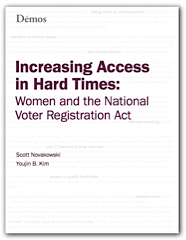The Great Recession of 2008 and its after-effects still are radically impacting the lives of millions. While men initially bore the heavier burden, women are now increasingly falling victim to unemployment, fore- closure, and eviction. Low-income women have been hit particularly hard. Women’s History Month provides an apt occasion to consider both what low-income women have at stake in current debates over the economic policies that shape our lives, and how they can gain a greater voice in those debates.
The realities of women’s economic status, exacerbated by the economic downturn make it especially important for low-income women to be able to exercise their full political clout. Yet, for a variety of reasons, their rates of voter registration—a threshold requirement in most states for the most fundamental means of political participation, voting—remain low: In 2008, almost one-third of low-income women were not registered to vote.
Fortunately, there is already a law on the books that has the potential, if implemented properly, to open up the political process to millions of low-income women. Section 7 of the National Voter Registration Act of 1993 requires state public assistance agencies to provide voter registration services to clients and applicants for benefits. As women are increasingly affected by the economic downturn and as public assistance rolls expand dramatically, the NVRA may be the most effective vehicle for ensuring that low-income women have a voice in the democratic process.

